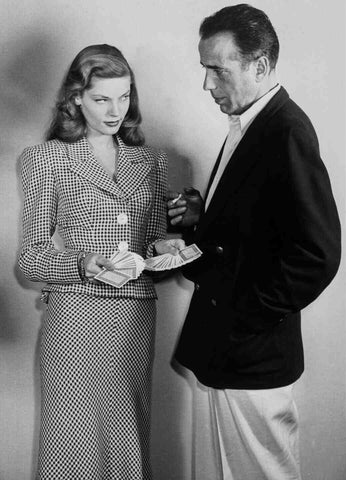Gingham or Vichy?
First of all, what is Vichy???!!!
It is the French name through which it is known gingham, a plain fabric made of dyed cotton or cotton-blend yarn.
When originally imported into Europe in the 17th century, Gingham was a striped fabric, while now it is known for its checkered pattern. Its name probably comes from a Malay adjective, “Genggang”, which means “striped.” The change occurred when mills in Manchester, England, began to produce the print in a checkered design.

Beaming Deartment at Regent Cotton Mill owned by the Lancashire Cotton Corporation Limited, in Failsworth, 1930s - Manchester Evening News
Alternatively, the name itself may have originated in the village of Guingamp in the town of Brittany, France.
A third version regarding the origins of this colourful, yet humble, print can be traced back to the French city of Vichy. This eclectic town in the centre of France, next to the river Allier, is also known for its spa and 1930’s Art-Deco cathedral and for being the administrative centre of France during World War II, during the German occupation. The trend emerged in the seventeenth century in the interiors of the French region of La Provence. At first, the print was used on tablecloths and napkins and after 1946, in the postwar era, this type of plaid was used in men's and women's shirts who worked in the fields.

Shortly after, this fabric jumped from the domestic and rural sphere to fashion, and the Vichy or gingham fabric became popular allowing people to follow fashion and buy cheap, ready-to-wear clothes.
This was also true of the movie industry: several actresses wore iconic gingham pieces in 40s and 50s:

Blue gingham dress worn by Judy Garland in “The Wizard of Oz” (filmed styled by designer Adrian in 1939)

Gingham shirt and skirt worn by Katherine Hepburn in “The Philadelphia Story” (1940)

The impeccable Vichy suit, worn by Lauren Bacall in “To Have and Have Not,” side to side with Humphrey Bogart, elevating the print to the status of a classic

And lastly a favourite of ours, the male-cut jacket with a Vichy pattern worn by Ingrid Bergman on one of her most famous movies, “Notorious” (Alfred Hitchcock, 1946) co-staring Cary Grant
Back in Europe, the French designer Jacques Esterel created in 1959 an original Vichy check print wedding suit in pink and white with lace details for Brigitte Bardot for her wedding with Jacques Charrier. The couturier skipped all wedding attire stereotypes of the time by using this fabric and colour and this print therefore became associated with the iconic French actress and therefore a symbol of eternal femininity.

Brigitte Bardot's pink gingham wedding dress - 1959
The 60s and the 70s were the explosion and then consolidation of the gingham fabric, when everyone, from actresses to men, wore gingham creations in dresses and shirts, creating a relaxed and natural style.

Marilyn Monroe by Alfred Eisenstaedt, 1953

Lady Diana, sporting pink gingham trousers and an oversize shirt, she was undoubtedly the Queen of smart casual and an inspiration for us
Today the print is reinvented every season by designers and by fashionistas on the street, adapting it to any style. The infinite possibilities offered by this print makes it a must print available each season.

Linda Evangelista for Versace 1994 Couture Show

Loewe SS18 2-toned gingham dress

Balenciaga SS18 "paparazzi" campaign

Stretchy gingham top Jacquemus SS21
